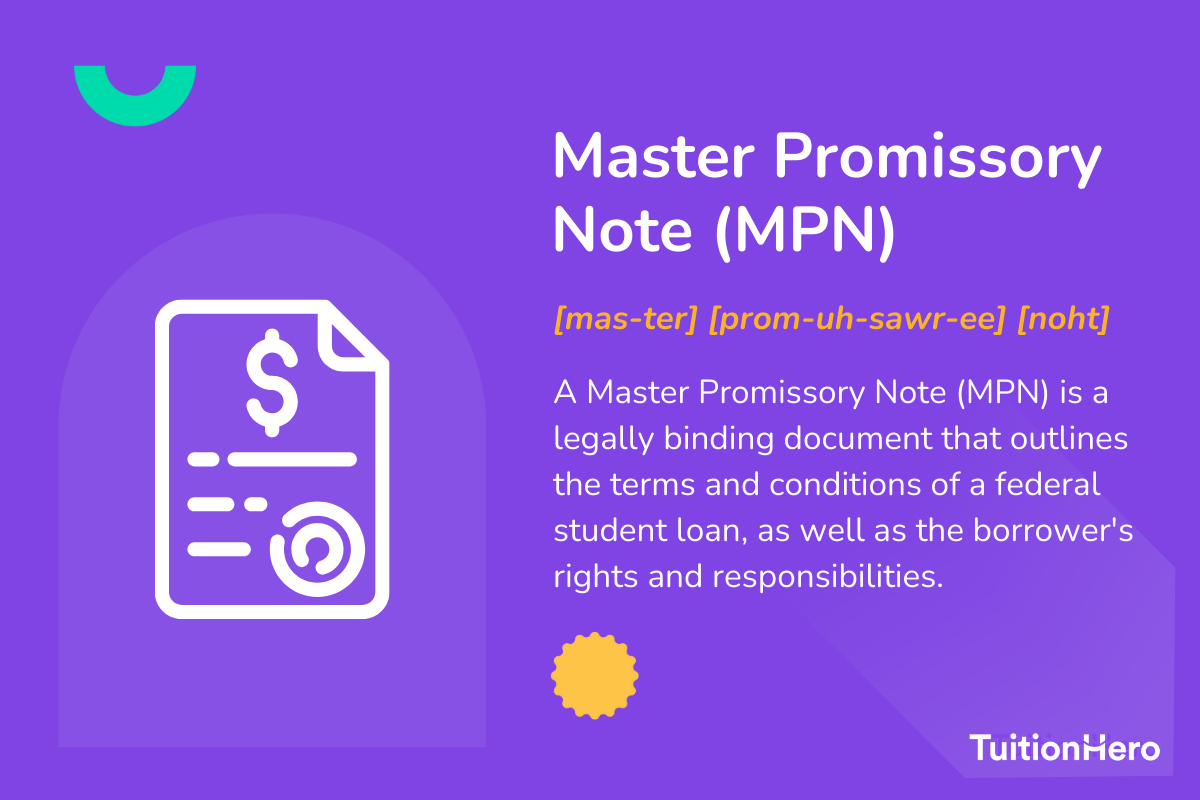Advertiser Disclosure
Last update: November 17, 2024
5 minutes read
What is a Master Promissory Note?
Understand what a Master Promissory Note is and how to navigate it effectively. Explore how it works, when to sign one, and why it's important.

By Brian Flaherty, B.A. Economics
Edited by Rachel Lauren, B.A. in Business and Political Economy
Learn more about our editorial standards



By Brian Flaherty, B.A. Economics
Edited by Rachel Lauren, B.A. in Business and Political Economy
Learn more about our editorial standards
Have you agreed to a Master Promissory Note (MPN) for your college loans, and do you fully understand what it means? It's a serious legal agreement that sets the rules for your federal student loans. You'll learn all about MPNs—how they work, when to sign them, and why it's important to understand the details of these contracts.

Key takeaways
- An MPN is a legally binding document that outlines the terms of your federal student loans
- You may need to sign a new MPN in some situations, like taking out a new type of loan or when a previous note expires
- Unlike regular promissory notes, an MPN covers multiple loans for up to 10 years
What is a Master Promissory Note?
A Master Promissory Note is a legal contract you sign when taking out federal student loans, committing to pay back the borrowed amount along with interest and fees. It includes all the terms and conditions of your loan, like repayment plans and loan limits.
When I was taking out my student loans, I remember being a bit confused about all the various terms and rules. Thankfully, I could turn to the Master Promissory Note to understand exactly what I was signing up for in clear language. As you navigate the student loan process, make sure you dig into the details of this document to understand the agreement you’re making.

How does a Master Promissory Note define my loan terms?
When you sign a Master Promissory Note (MPN), you're making a serious commitment on a legal document. It spells out important details, like how they'll calculate the interest on your loan and when you need to make payments. It's not just about getting money; it's a deal that decides how much you'll have to pay back in the end, including:
- Interest rates
- Repayment schedules
- Late fees and penalties
- Deferment and forbearance options
- Loan cancellation conditions
Knowing these details is crucial because they directly influence the true cost of your education.
When do I need to sign a Master Promissory Note?
You'll generally sign an MPN before you get your first loan disbursement, but there are instances when a new MPN is necessary:
- If you've never signed an MPN before.
- Your school insists on a fresh MPN each academic year.
- You've enrolled in a foreign institution, such as during a study abroad program.
- A year has passed since your MPN was signed and your loan hasn't been disbursed.
- 10 years have passed since your MPN was signed.
For Federal PLUS loans, the rules change a bit. If you're borrowing with an endorser, or as a parent for multiple children, expect to sign new MPNs for each scenario.
What's the difference between an MPN and a regular promissory note?
Promissory notes are promises to pay back money you borrowed. These notes are a general tool that can be used in a wide variety of borrowing scenarios, like taking out a mortgage or a personal loan.
An MPN (Master Promissory Note), on the other hand, is a specific agreement used in the federal student loan process. It’s a useful tool that covers many loans over several years, lasting up to a decade of continuous schooling. Instead of signing a new agreement for each loan, the MPN is a one-size-fits-all solution, making things simpler for you.
How do I complete my Master Promissory Note?
Filling out an MPN doesn't have to be confusing. Here's how you do it:
- Visit your school's financial aid office or the Federal Student Aid website.
- Use your FSA ID to sign in.
- Fill out the form with your info and your college's details.
- Read carefully and understand every term. This document will be your loan's rulebook.
- Sign electronically and submit.
Compare private student loans now
TuitionHero simplifies your student loan decision, with multiple top loans side-by-side.
Compare Rates
What references do I need for my MPN?
When it comes to your finances, the government wants some information. They ask for the names of two people who've known you for three years. Just keep in mind:
- Person 1: Ideally a parent or guardian.
- Person 2: Another person who knows your whereabouts (but isn't your roommate).
The goal is to make sure the government can find you if you decide to go off the radar after you graduate.
Do parents sign their own MPN for federal loans?
Sure thing! Parent loans, like Parent PLUS loans, need their own MPN. Just like an MPN linked to an undergraduate loan, a parent MPN will outline loan terms like:
- Borrowing limits
- Interest rates
- Repayment conditions
Understanding these financial details is important as students navigate their way through college expenses. To make sure you're on track, it's crucial to be aware of the details. If you're dealing with loans and could use some help or more information, take a look at TuitionHero's section on Federal PLUS Loans before making any decisions.
Do’s and don'ts of signing a Master Promissory Note
Signing a Master Promissory Note is an important financial step for students or parents dealing with college costs. To help you do this right, here's a simple breakdown of what you should and shouldn't do:
Do
Read the entire MPN before signing.
Check the interest rate and repayment terms carefully.
Ask questions if anything is unclear.
Keep a copy of the MPN in a safe place.
Make on-time payments to build credit.
Don't
Skim over the details, assuming they're just formalities.
Ignore details about interest accrual and capitalization.
Assume you'll figure it out on your own.
Misplace your documents; you'll need them for future reference.
Default on your loan obligations.


Why trust TuitionHero
At TuitionHero, we're here to help you figure out college finances. Whether you're thinking about private student loans, considering loan refinancing, looking for scholarships, dealing with FAFSA, or checking out credit card offers, we've got you covered. Understanding a Master Promissory Note might seem tricky, but we give you the guidance you need. With our help, you can confidently sign an MPN, making sure you use all the available resources to fund your education wisely and securely.
Frequently asked questions (FAQ)
Yes, you have a short window to cancel a loan after signing an MPN. Usually, your school will send you a notice before it disburses the loan funds, and you may cancel part or all of the loan within a specified period detailed by your school. If you've got questions on timing, TuitionHero’s financial aid experts can help clear up any confusion.
There are times when an MPN (Master Promissory Note) might not be valid anymore. For example, if your eligibility changes or if the note was signed a long time ago and no loans were disbursed. Want to make sure yours is still valid? Get in touch with us for a quick check.
If your cosigner or endorser for a PLUS loan passes away, it might change the situation with your MPN. You may have to do a new application or agreement.
It can be a tough time, so it's a good idea to talk to our advisors. They can help you figure out the best steps to take during this difficult situation.
Getting out of an MPN isn't easy; it's designed to be a serious commitment. But, in specific situations like school closure, false certification, or disability, you might be eligible for a discharge. TuitionHero can help you figure out how to handle these situations and find a way to possibly get out of it.
Final thoughts
Completing the Master Promissory Note is important for your financial future in education. It's a document that you should take the time to understand, so don't rush through it. To navigate student finance smoothly and sign with confidence, check out TuitionHero for personalized support and resources.
Source
Author

Brian Flaherty
Brian is a graduate of the University of Virginia where he earned a B.A. in Economics. After graduation, Brian spent four years working at a wealth management firm advising high-net-worth investors and institutions. During his time there, he passed the rigorous Series 65 exam and rose to a high-level strategy position.
Editor

Rachel Lauren
Rachel Lauren is the co-founder and COO of Debbie, a tech startup that offers an app to help people pay off their credit card debt for good through rewards and behavioral psychology. She was previously a venture capital investor at BDMI, as well as an equity research analyst at Credit Suisse.
At TuitionHero, we're not just passionate about our work - we take immense pride in it. Our dedicated team of writers diligently follows strict editorial standards, ensuring that every piece of content we publish is accurate, current, and highly valuable. We don't just strive for quality; we aim for excellence.
Related posts
While you're at it, here are some other college finance-related blog posts you might be interested in.
Shop and compare student financing options - 100% free!

Always free, always fast
TuitionHero is 100% free to use. Here, you can instantly view and compare multiple top lenders side-by-side.

Won’t affect credit score
Don’t worry – checking your rates with TuitionHero never impacts your credit score!

Safe and secure
We take your information's security seriously. We apply industry best practices to ensure your data is safe.
Finished scrolling? Start saving & find your private student loan rate today





